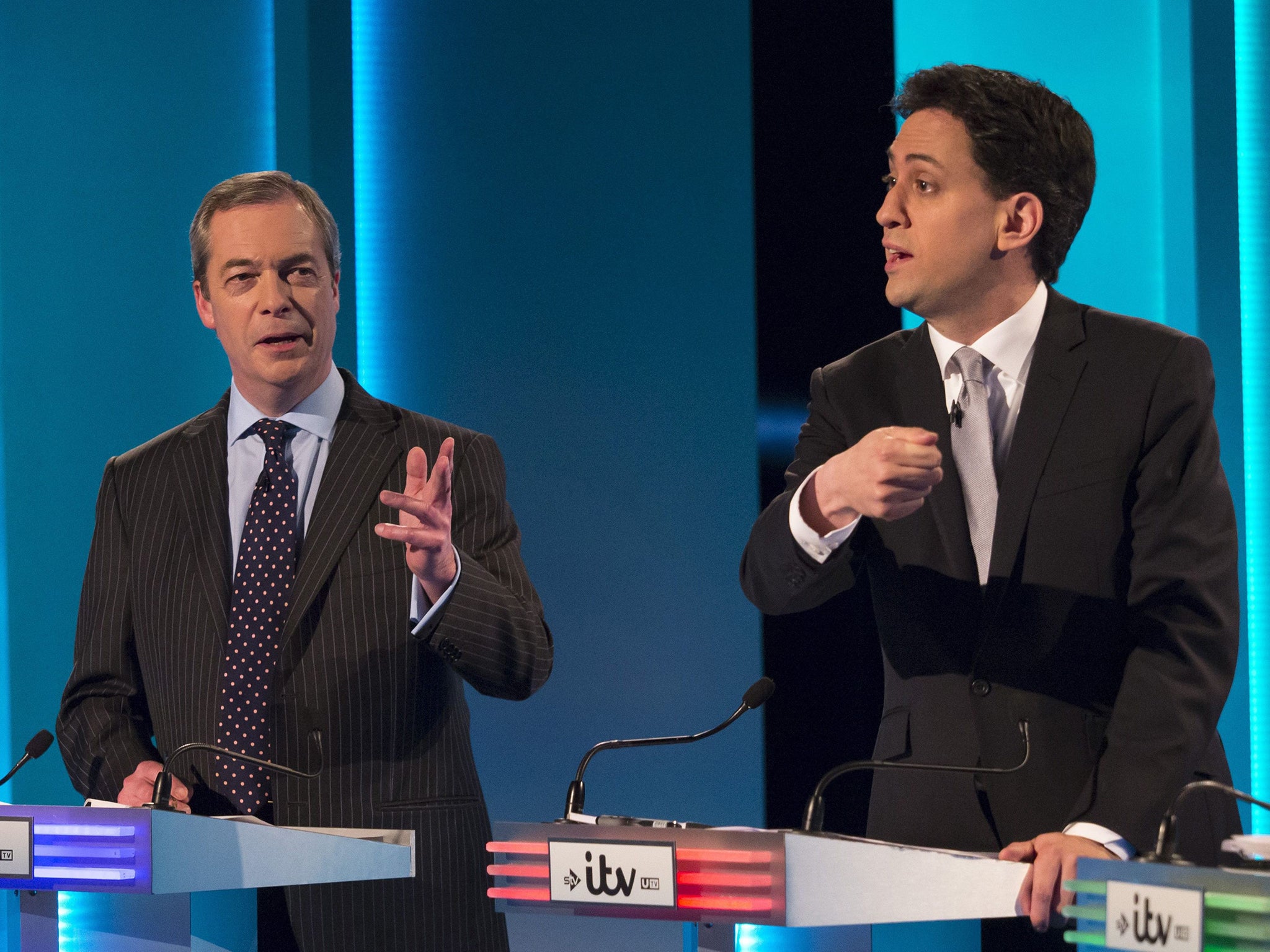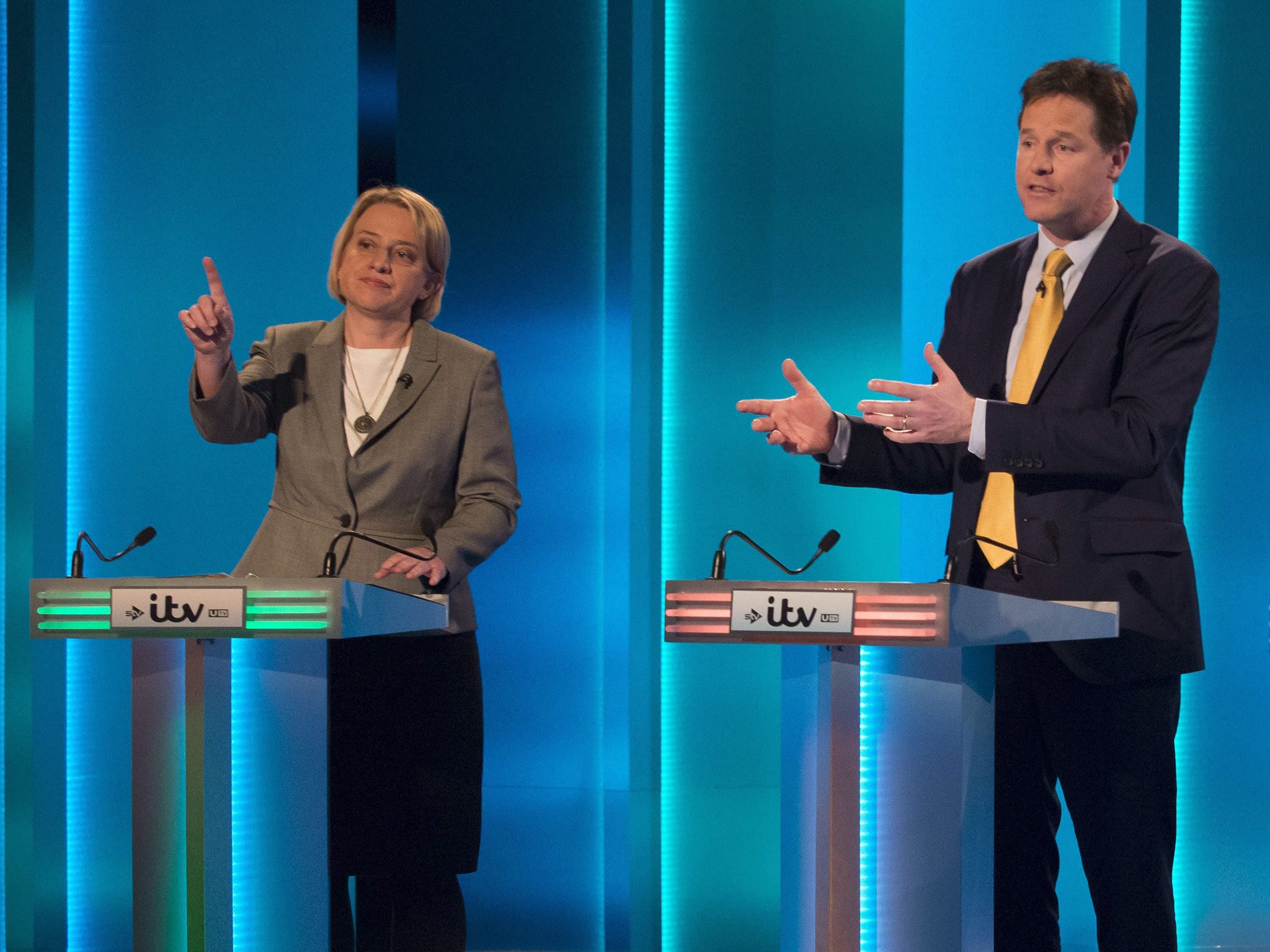Leaders' TV debates: A battleground for David Cameron and Ed Miliband but poll declares SNP leader Nicola Sturgeon the winner
Historic television event demonstrates breadth of choice facing voters in unprecedented election
Your support helps us to tell the story
From reproductive rights to climate change to Big Tech, The Independent is on the ground when the story is developing. Whether it's investigating the financials of Elon Musk's pro-Trump PAC or producing our latest documentary, 'The A Word', which shines a light on the American women fighting for reproductive rights, we know how important it is to parse out the facts from the messaging.
At such a critical moment in US history, we need reporters on the ground. Your donation allows us to keep sending journalists to speak to both sides of the story.
The Independent is trusted by Americans across the entire political spectrum. And unlike many other quality news outlets, we choose not to lock Americans out of our reporting and analysis with paywalls. We believe quality journalism should be available to everyone, paid for by those who can afford it.
Your support makes all the difference.The Coalition came to an acrimonious end as David Cameron and Nick Clegg clashed in a leaders’ TV debate which gave Britain a glimpse of the multi-party future that may follow next month’s general election.
After a two-hour debate on ITV involving seven party leaders, pollsters YouGov declared Nicola Sturgeon, the SNP leader, the victor with 28 per cent. Nigel Farage, the Ukip leader, came second on 20 per cent, ahead of Mr Cameron on 18 per cent. Ed Miliband was fourth on 15 per cent, followed by Mr Clegg (10 per cent), Natalie Bennett of the Greens (5 per cent) and Plaid Cymru’s Leanne Wood (4 per cent).
Other post-debate surveys produced a different verdict. ICM for The Guardian gave Mr Miliband a narrow win over Mr Cameron (by 25 to 24 per cent). But ComRes for ITV News made it a three-way tie between Mr Cameron, Mr Miliband and Mr Farage. A later poll by Survation put Cameron and Miliband joint first at 25 per cent, then Farage at 24 per cent, Surgeon at 15 per cent, Clegg at 6 per cent, Bennett at 3 per cent and Wood at 2 per cent.
The Prime Minister had wanted the seven-way debate rather than a head-to-head with Mr Miliband. The Tories claimed Mr Cameron was “in control” but Labour insisted he was “virtually silent” and could not defend his record.
Mr Clegg distanced himself from his Tory coalition partner, attacking Mr Cameron’s refusal to raise taxes for the rich, for planning further deep cuts and over his flagship free schools. An angry Mr Cameron replied sharply that he defended all the Coalition’s decisions, accusing the Liberal Democrat leader of adopting a “pick and mix” approach.
Mr Miliband mocked the Prime Minister and his deputy, saying: “They’re both blaming each other – and they’re both right.”
In the only head-to-head battle of the election campaign between Mr Cameron and Mr Miliband, they clashed over the economy and the NHS as they played their favourite cards in what has been dubbed a “wealth versus health” election. Mr Cameron seized on reports that Mr Miliband wanted to “weaponise” the NHS, but the Labour leader retorted: “I would say to everybody at home – use your vote as a weapon to fight for the future of the health service.”
The Prime Minister warned that Labour would wreck the economy and told Tories who have defected to Ukip they risked letting Mr Miliband into Downing Street “by the back door”. He said: “That will give you open door immigration.”
Mr Clegg opened the debate by turning on his Coalition partner, Mr Cameron, asking him pointedly why the Conservatives “are not going to ask the richest in society to make a single extra penny of contribution to balancing the books through the tax system?”
Mr Cameron replied: “Nick is wrong about our plans.” He insisted the deficit could be cleared without raising taxes, by saving £1 of every £100 of government spending. “What I’m hearing [from the other leaders] is more debt and more taxes,” he said.
The Prime Minister sought to shift the spotlight on to Labour’s proposed tax rises. He brandished a copy of the note left by Liam Byrne, the Labour Chief Treasury Secretary, in 2010, saying: “We have run out of money.” The Labour leader accused Mr Cameron of talking about the past and not the present or the future.
Ms Sturgeon said “I back Ed [Miliband]” on raising the 45p top rate of tax, but then clashed with him over the need for austerity. Mr Miliband said: “Cuts will have to come, but we can do it in a balanced way.”
For the Greens, Ms Bennett said: “Nicola Sturgeon is absolutely right. You have a choice between the two largest parties here between austerity-heavy and austerity-light.”
Mr Farage accused Mr Cameron of failing to cut a deficit still running at £90bn.

NHS
The Coalition’s stewardship of the health service came under heavy fire, with Mr Miliband claiming it was “creaking at the seams”. He said one million people faced waits of more than four hours at accident and emergency departments last year while ambulances queued outside hospitals.
The Prime Minister said there were 7,000 more nurses and 9,000 more doctors and 20,000 fewer managers than five years ago, while cancer survival rates were increasing. He said: “We’re changing the NHS and we’re improving it.”
Mr Clegg said the Lib Dems were committed to finding the extra £8bn that the NHS needs over the next five years. He accused his rivals of warm words and said: “If you love the NHS so much, why don’t you put your money where your heart is?”
Mr Farage, who called for a £3bn investment in health funded by leaving the EU, risked controversy by saying 60 per cent of people diagnosed as HIV-positive in this country were foreign.
After he said the NHS should be for British people, Ms Wood won the first applause of the evening when she accused Mr Farage of “scaremongering”.
Ms Bennett claimed there was a “race” towards privatisation within the NHS, adding: “Profit motive should have no place in healthcare.”

Immigration/Europe
Amid the most heated exchanges of the night, Mr Farage went on the offensive, saying the six other leaders were “all the same” because they would remain in the EU. The Ukip leader challenged Mr Cameron to confirm that the EU’s free movement principle would “not be up for discussion” when he renegotiates the UK’s membership terms. The Prime Minister replied: “You don’t give up before you have begun.”
Mr Miliband admitted: “We did get it [immigration] wrong and I have changed our approach.”
Mr Clegg said: “I will never spread fear about immigration. We have to remember there is good immigration and bad immigration – of course, that has to be stopped.”
For Plaid Cymru, Ms Wood demanded a guarantee that in Mr Cameron’s in/out referendum, all four countries in the UK would have to vote “out” before Britain could leave, rather than England “pulling everyone else out”.

Next generation
Mr Clegg said record numbers of young people were going into higher education despite his “infamous” support for steep increases in tuition fees to £9,000.
The Prime Minister said the Coalition had opened up the education system through the academies and free schools programmes, adding that 1m children were in good or outstanding schools.
Calling for a reduction in tuition fees to £6,000, Mr Miliband said: “I don’t want our young people drowning in debt when they leave university.”
Ms Bennett said the current generation of politicians needed to “stop trashing the planet”.
The Independent has got together with May2015.com to produce a poll of polls that produces the most up-to-date data in as close to real time as possible.
Click the buttons below to explore how the main parties' fortunes have changed:
All data, polls and graphics are courtesy of May2015.com. Click through for daily analysis, in-depth features and all the data you need. (All historical data used is provided by UK Polling Report)

Join our commenting forum
Join thought-provoking conversations, follow other Independent readers and see their replies
Comments